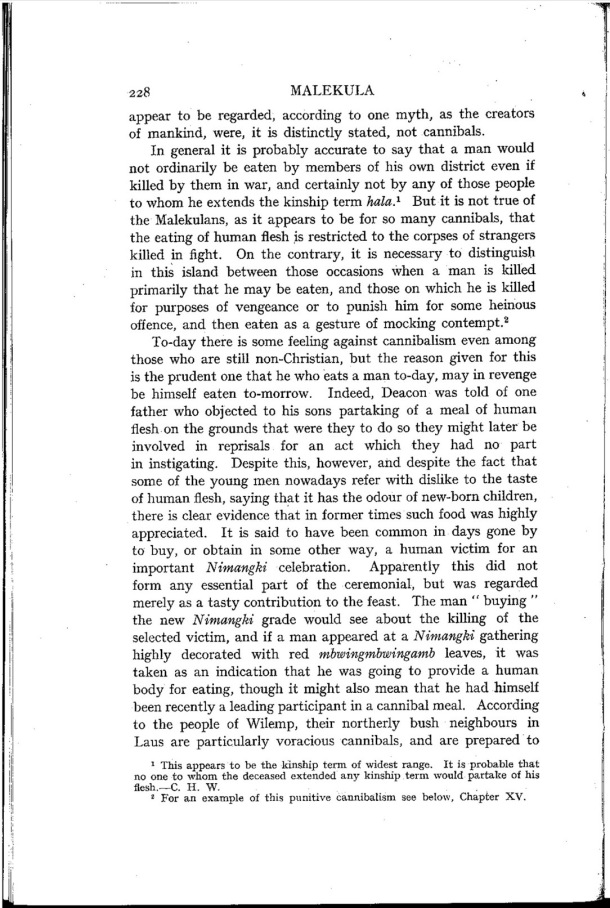|
|  [Note: this transcription was produced by an automatic OCR engine]
ll
nl
228 MALEKULA
appear to be regarded, according to one myth, as the creators
of mankind, were, it is distinctly stated, not cannibals.
In general it is probably accurate to say that a man would
not ordinarily be eaten by members of his own district even it
killed by them in war, and certainly not by any of those people
to whom he extends the kinship term hula.‘ But it is not true of
the Malekulans, as it appears to be for so many cannibals, that
the eating of human flesh is restricted to the corpses of strangers
killed in ï¬Åght. On the contrary, it is necessary to distinguish
in this island between those occasions when a man is killed
primarily that he may be eaten, and those on which he is killed
for purposes of vengeance or to punish him for some heinous
offence, and then eaten as a gesture of mocking contempt?
To-day there is some feeling against cannibalism even among
those who are still non-Christian, but the reason given for this
is the prudent one that he who eats a man to-day, may in revenge
be himself eaten to-morrow. Indeed, Deacon was told of one
father who objected to his sons partaking of a meal of human
flesh on the grounds that were they to do so they might later be
involved in reprisals for an act which they had no part
in instigating. Despite this, however, and despite the fact that
some of the young men nowadays refer with dislike to the taste
of human ï¬Åesh, saying that it has the odour of new-born children,
there is clear evidence that in former times such food was highly
appreciated. It is said to have been common in days gone by
to buy, or obtain in some other way, a human victim for an
important Nimzmgki celebration. Apparently this did not
form a.ny essential part of the ceremonial, but was regarded
merely as a tasty contribution to the feast. The man “ buying "
the new Nimangki grade would see about the killing of the
selected victim, and it a man appeared at a Nimangki gathering
highly decorated with red mbwingmbwingamb leaves, it was
taken as an indication that he was going to provide a human
body for eating, though it might also mean that he had himself
been recently a leading participant in a cannibal meal. According
to the people oi Wilemp, their northerly bush neighbours in
Laus are particularly voracious cannibals, and are prepared to
1 This appears to be the kinship term of widest range. It is probable that
no one to whom the deceased extended any kinship term would partake of his
flesh.—C. H. w. _
= For an example of this punitive cannibalism see below, Chapter xv.
:4
_.-_._4
l
|